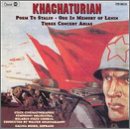| All Artists: Khachaturian, Boiko, Mnatsakanov Title: Khachaturian: Poem to Stalin / Ode in Memory of Lenin / Three Concert Arias Members Wishing: 0 Total Copies: 0 Label: Citadel Release Date: 10/27/1998 Genres: Jazz, Pop, Classical Styles: Opera & Classical Vocal, Historical Periods, Modern, 20th, & 21st Century Number of Discs: 1 SwapaCD Credits: 1 UPC: 795818813125 |
Search - Khachaturian, Boiko, Mnatsakanov :: Khachaturian: Poem to Stalin / Ode in Memory of Lenin / Three Concert Arias
 | Khachaturian, Boiko, Mnatsakanov Khachaturian: Poem to Stalin / Ode in Memory of Lenin / Three Concert Arias Genres: Jazz, Pop, Classical |
Larger Image |
CD Details |
CD ReviewsA Guilty Pleasure? Thomas F. Bertonneau | Oswego, NY United States | 11/07/2000 (4 out of 5 stars) "At least one musical friend of mine will not listen to Furtwängler's 1942 account of Beethoven's Ninth, as high officials of the National Socialist Party sat in attendance when the Reichs Rundfunk recorded the concert. Another equally musical friend will not listen to "Carmina Burana," as its composer, Carl Orff, seems to have made his score congenial to National Socialist ideals of "folkish art." On the other hand, a staunchly anti-Communist acquaintance who fled Hungary after the abortive uprising of 1956 listens with interest to Prokofiev's "Cantata on the Twentieth Anniversary of the October Revolution." "The text is repugnant," he says, "but the music is Prokofiev's." And it is the music to which he turns his ear. The music, then, must justify the works by Aram Khachaturyan (1903-1978) on this disc of his overtly Stalinist oeuvre; for anyone aware of events unfolding in the USSR in the decade when Khachaturyan wrote these scores will need to "bracket" (as the phenomenologists say) the verbal element of the listening experience. The earliest of the three, "Poem to Stalin," comes from 1938, just after "the Man of Steel" had used the show-trials to complete the slaughter of his old revolutionary comrades, along with several thousand other citizens of the Socialist Republics whom the Leader and Teacher's judicial henchmen had accused of "sabotage," "wrecking," and "counter-revolutionary activity." (Prokofiev's "Zhdravitsa" [1939] emerged in the same grisly aftermath.) The "Poem" shows the same general pattern as the purely orchestral "Triumphal Poem" (1957) of twenty years later: A chain of singable, folk-inflected melodies leading up to a brassy apotheosis of the Leader and Teacher. The tunes boast the exotic flavor that we expect from this Russian-Georgian-Armenian composer, and as long as one pays no heed to the words, it is exciting in a cinematic way. The "Ode in Memory of Lenin" (1948) began, indeed, as the projected accompaniment of a motion picture. The date once again possesses significance, for 1948 marks the moment of "Zhdanovshchina," the renewal of Stalin's repressive measures against Soviet artists, including ironically Khachaturyan himself. Not quite as striking melodically as the "Poem," the "Ode" nevertheless makes its point with more cogency. At about ten minutes, it needs only half the performing-time of the earlier piece. The "Three Concert Arias" constitute a "concerto for high voice" to join the other solo-with-orchestra scores that carry Khachaturyan's name. While the three texts have nothing to do with each other (but at least none mentions Stalin!), the melodies (as always) exert considerable appeal. This material is partly duplicated on a new ASV disc with Loris Tjeknavorian and an Armenian orchestra."
|
